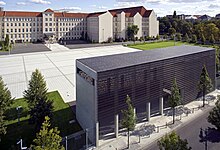Ehrenmal der Bundeswehr | |
 The Bundeswehr Memorial with the Bendlerblock in the background | |
 | |
| 52°30′25″N 13°21′41″E / 52.50694°N 13.36139°E | |
| Location | Across from the Bendlerblock in Berlin |
|---|---|
| Designer | Andreas Meck |
| Beginning date | 2008 |
| Completion date | 2009 |
| Dedicated to | Dead of the German Bundeswehr |
Bundeswehr Memorial
editHistory
editIn 2007 German Federal Minister of Defense Franz Josef Jung presented plans for the creation of a central memorial for the Bundeswehr to be built in Berlin. Jung stated he came up with the idea after a visit to Afghanistan and so a memorial for Bundeswehr troops deployed there. A committee was set up and eventually settled on a design by architect Andreas Meck that would both allow for public access for visitors but also allow for individual mourning. Then Inspector General of the Bundeswehr General Wolfgang Schneiderhan said of the memorial: "In Germany, the Army, Air Force, and Navy commemorate their dead soldiers at the memorials of their respective branches of the armed forces in Koblenz, Fürstenfeldbruck, and Laboe. What is still missing today, however, is a central place where all the dead of the Bundeswehr can be remembered in a dignified manner."
Ultimately the memorial was chosen to be built directly across from the headquarters of the Federal Ministry of Defense at the Bendlerblock, and the foundation stone was placed at the site on 27 November 2008. The memorial was inaugurated on 8 September 2009 in a ceremony led by Federal President Horst Köhler. In response to criticism a bronze book of remembrance with the names of killed Bundeswehr soldiers was added in 2014 and an information room in 2018.
Design
editCriticism
editCriticism was directed at the way the names of killed soldiers was displayed, with the names projected for only five seconds at a time and the fact that they can be difficult to see in bright sunlight. The lack of biographical information on the soldiers was also critiqued as well as missing names at the time of construction.[1] Criticism was addressed with the addition of a bronze book of remembrance with the names of the dead in 2014 and the opening of an information room in 2018. The Free Democratic Party had also unsuccessfully pushed for the memorial to be located in the vicinity of the Reichstag in order to emphasize the Bundeswehr as a parliamentary army.
Other Memorials
editMemorials of the Armed Forces
editThe three branches of the Bundeswehr each have their own branch specific memorials:
- The German Army Memorial at the Ehrenbreitstein Fortress in Koblenz
- The Laboe Naval Memorial near Kiel and the Möltenort U-Boat Memorial in Heikendorf
- The Luftwaffe Memorial in Fürstenfeldbruck.
The Laboe naval memorial was built between 1926 and 1936 while the U-Boat memorial was erected in 1930, the Luftwaffe memorial in 1962 and the Army memorial in 1972.
-
Laboe Naval Memorial
-
German Army Memorial
-
Luftwaffe Memorial
-
U-boat Memorial
Forest of Remembrance
editOn 15 November 2014 the Forest of Remembrance (Wald der Erinnerung) was inaugurated in the forest area of the Henning von Tresckow barracks in Schwielowsee, the site was used to re-erect various Bundeswehr monuments originally built overseas to honor Bundeswehr soldier who served or were killed in foreign operations. The forest is intended for private reflection with families able to plant trees or mark existing trees to commemorate the dead.[2]
For the forest various overseas monuments where transferred to the site and reconstructed as faithfully as possible although some were reduced in scale. Before being shipped to Germany the monuments were recorded in detail, dismantled piece by piece, and numbered and thoroughly documented. Before reconstruction, the pieces were professionally refurbished with appropriate weather protection.[3]
The site consits of memorials originally erected in Afghanistan such as at Bundeswehr Observation Post North and bases in Fayzabad, Kabul and Kunduz. Others include memorials erected in Sarajevo and Prizren and the most recent relocation from Mazar-i-Sharif in November 2022.[4]
-
Place of silence in the Forest of Remembrance
-
Rebuilt monument from Sarajevo
-
Rebuilt memorial from Kunduz
-
Rebuilt memorial from Kabul
-
Rebuilt memorial from Fayzabad
-
Rebuilt memorial from Prizren
-
Rebuilt memorial from Observation Post North
-
Personal memorial plaque on a tree at the Forest of Reembrace
Criticism of the Forest of Remembrance
editIn 2014 former Bundestag Bundeswehr Commissioner Reinhold Robbe criticized the location of the memorials as "shameful", saying that placing them at the remote Schwielowsee represented a "misguided culture of remembrance in Germany". He further stated that instead of creating a prominent place at the center of Berlin to commemorate fallen members of the Bundeswehr they had instead been "hidden" and that it was a "slap in the face for the relatives".[5]
External Links
editReferences
edit- ^ "For Peace, Justice and Freedom The Forgotten Dead of the Bundeswehr". Retrieved 2024-12-06.
- ^ "Der Wald der Erinnerung Ein Ort der Stille mit wiedererrichteten Ehrenhainen" (PDF). Archived from the original (PDF) on 2024-10-07. Retrieved 2024-12-06.
- ^ "Der Wald der Erinnerung Ein Ort der Stille mit wiedererrichteten Ehrenhainen" (PDF). Archived from the original (PDF) on 2024-10-07. Retrieved 2024-12-06.
- ^ "Memorial grove from Masar -i -Sharif rebuilt in Germany". Archived from the original on 2024-04-19. Retrieved 2024-12-06.
- ^ "Reinhold Robbe on the "Forest of Remembrance": Former military commissioner criticizes memorial for soldiers". Archived from the original on 2023-06-21. Retrieved 2024-12-06.